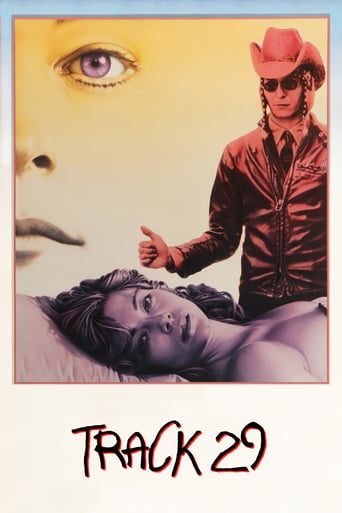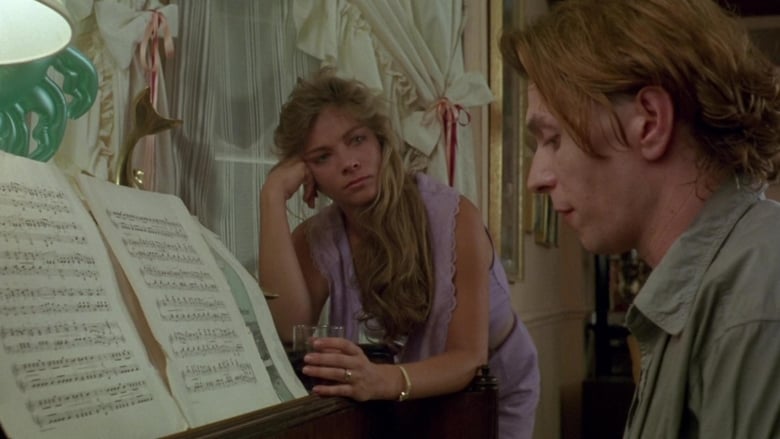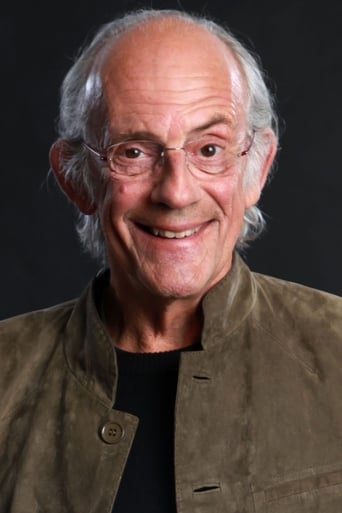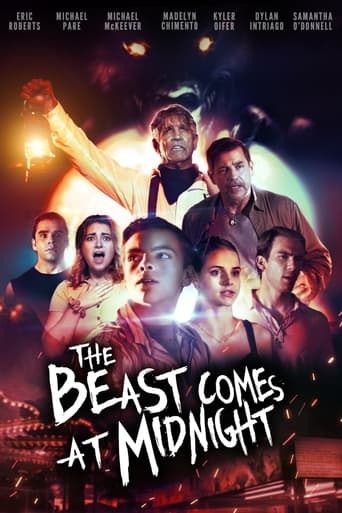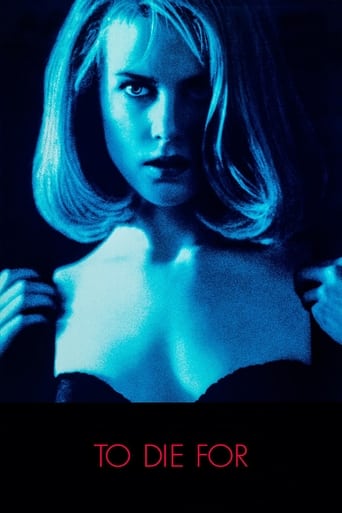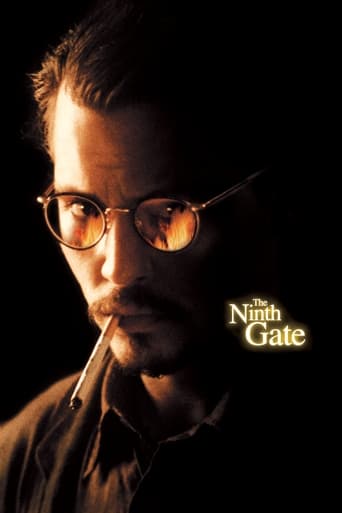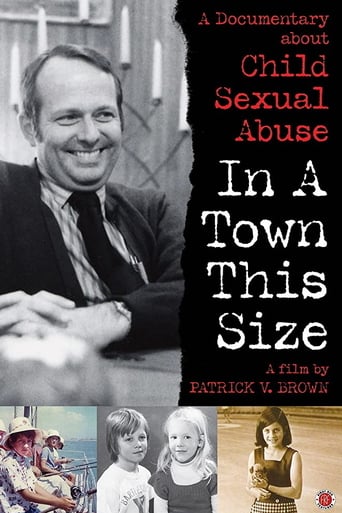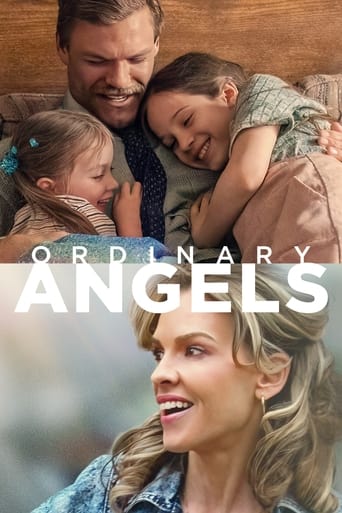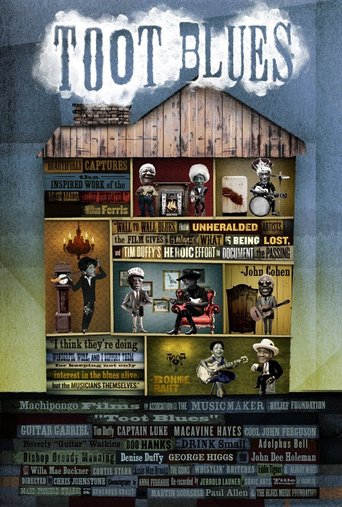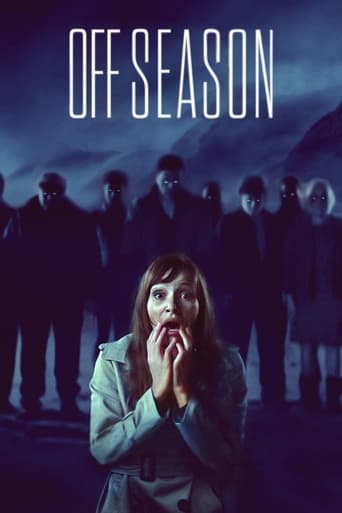Track 29 (1988)
Years after a desperate teenage Linda gives up her baby for adoption, she finds herself face-to-face with Martin, a young man claiming to be her long-lost son. Linda embraces Martin and in him finds a welcome reprieve from her unhappy marriage to the neglectful Henry. But soon Martin grows violent and becomes obsessed with Henry -- a philandering man whose only offspring is an expansive model train set that devours his waking hours.
Watch Trailer
Cast


Similar titles
Reviews
Very Cool!!!
Pretty good movie overall. First half was nothing special but it got better as it went along.
A great movie, one of the best of this year. There was a bit of confusion at one point in the plot, but nothing serious.
Close shines in drama with strong language, adult themes.
In a small southern American town, housewife Linda Henry lives a unsatisfied life and wants a child to fulfil that gap, but her husband Henry seems more concerned about his model trains and receiving his fetish spanking from nurse Stein. One day in a diner, an odd and mysterious young English lad Martin approaches Linda and her friend. He seems to appear where she is, so when another confrontation eventuates. He admits to being her son, which he was taken from her at birth when she was a teenager, due to the reasoning of his conception. This newfound responsibility is bittersweet for Linda, but has it come at a price for her well-being. Bizarre, extremely bizarre and sultry! Nicholas Roeg's "Track 29" is really hard to fathom, which can make it quite frustrating, due to the fact the pieces of this hysterically traumatic psychological puzzle never come to be one. Maybe that was on purpose, as the dysfunctional characters (usually lurking in small town settings) we follow seem rather disconnected, never quite sure of themselves and longing for something which could lead to an emotional breakdown. This exploration into the protagonists' wavering consciousness brings out many facets, like revelations of the past and those things that matter most for them to feel anything. The obsessive nature takes hold, where torment and frustration develops with neurotic results, which could finally lose out to fantasy, because reality and their situation is just to hard to come to grips with. Because of that, Dennis Potter's unbalanced, warped screenplay really does put you on the spot and throws around plenty of eye-boggling surreal passages. Symbolic clues feature thickly throughout and the themes that drown the moody, but complex script leave a strong imprint. While I don't think it's all-successful in conveying its ideas, it's still very interesting to watch. Building it up is the unusual kinky charge, perversely pitch-black humour and a terror-away performance by the nutty Gary Oldman. Boy, Oldman annoys with his infantile portrayal, but that peculiar intensity he generates and his edgy rapport with co-star Theresa Russell has you hypnotised. The two have some curious exchanges. Russell projects a fully realised performance, that bubbles, but you also feel her growing pain and uncertainty of her fragile character. Too bad about the southern accent though. Christopher Lloyd goes offbeat too, but more so in an understated and controlled turn. Sandra Bernhard's Nurse Stein makes an impression. Roeg's leisurely paced direction might not be as beautifully visceral, but winning out is a very gleeful and excessive approach that's high quality. Like Oldman's character, Roeg lets it play out like a kooky tantrum with a lingering mean-streak. The leering camera-work seems to hover on its shots awkwardly, or give it a smothering feeling, and the simmering music score is been kept under-wraps. Another original and provocative piece of work into the realm of surrealistic ambiguity combined with expressive allegories and a sensually twisted flavour. This one really challenges the viewer (like most of Roeg's work), then highly entertains.
As one of screenwriter Dennis Potter's few feature films, this is definitely worth seeing for fans of his work. Potter incorporates a grab-bag of typical themes (and a couple of familiar jokes) into a surrealistic erotic thriller. Oldman and Russell have a smoldering chemistry, and many of their scenes together are very well done.But ultimately, as a movie, Track 29 gets hung up on a couple of points. First of all, as everyone has pointed out, the southern accents are really, really bad in this movie. Oh what a difference a good language coach would have made. Given Potter's interest in accents, and social class, I can't help but think that the juxtaposition of the characters' strong East London and North Carolina accents was probably specified in the script, but the utter ineptitude of Russell and her co-stars to sound like they're actually from *anywhere* in the South keeps destroying the viewer's suspension of disbelief. The other stumbling block, is the director's style. Potter's writing, bred at the BBC, seems to work better when filmed in an understated, realistic style. He's a writer who really packs a lot into every line, and his material doesn't generally need to be "played up" at all in order to carry the intended impact; all the power is right there in the script. Unfortunately, Roeg comes out with both guns blazing, and while his over-the-top visual style works really well in some sequences (as when Oldman destroys the train set), the overall effect was one of "more is less". I couldn't help wondering as the movie ended how differently the script could have been handled by a director like Jonathan Demme, who not only has an ear for accents and an understated visual style, but also a more subtle understanding of class in rural America than any director I can think of. In the end, an enjoyably campy B-movie with unfulfilled potential for greatness.
A woman suffers mental trauma twenty years after being raped - at least that's the most obtainable synopsis for this bizarre but entirely unengaging drama. Theresa Russell plays the bored housewife, trapped in a passionless marriage with doctor Christopher Lloyd. When a man claiming to be her son - stolen from her arms at birth after the rape - appears out of nowhere, knowing an awful lot about her, it releases the trauma she has kept hidden for so long.What should be intriguing is anything but. It is impossible to care for Russell because she's embarrassingly bad. Lloyd has nothing to do (never mind nothing funny). The young Oldman is shown up in this most difficult of roles. That's probably thanks to the director more than himself. Roeg's output is horribly inconsistent. You would have hoped that working from a script by the late, brilliant Dennis Potter would have inspired him to make a masterpiece. He can't even keep the film on the ground.But then again, the Americans never got a grasp on Potter's humour. And Roeg has hardly been worth watching since he went to the States.
Nicholas Roeg's "Track 29", while confusing and frustrating, appears to accomplish what the director and writer set out to do. The film introduces and examines many aspects of Linda's life that are never very clearly answered. If Martin is a figment of her imagination, what is truly imagined? He does appear at the hamburger stand, so is he real after all? Early in the film, a television program is overheard discussing the idea that "two things may ocupy the same time and space". If this is indeed true, than maybe one thing can ocupy more than one time and space. It appears that Linda and Martin may in fact be "exploring" alternate dimensions. The film seems to explore the occurrence and outcome of many different events, and ends with the viewer unclear about what truly happened and what did not. After undergoing real or imaginary emotional torture, Linda calmly collects herself and leaves the house a new woman. To further confuse the lines between imaginary/real, her husband is heard calling to her, even though a pool of blood is forming over her head. (presumably from the stabbing death of the same husband) It is through these very strange events and ideas that the director and writer force the viewer to attempt to decide what is real and what is imagined. The most frustrating thing of all is that there is no real answer to this question.

